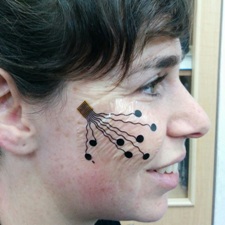 A new temporary «electronic tattoo» developed by Tel Aviv University that can measure the activity of muscle and nerve cells researchers is poised to revolutionize medicine, rehabilitation, and even business and marketing research.
A new temporary «electronic tattoo» developed by Tel Aviv University that can measure the activity of muscle and nerve cells researchers is poised to revolutionize medicine, rehabilitation, and even business and marketing research.
The tattoo consists of a carbon electrode, an adhesive surface that attaches to the skin, and a
The electrode, developed by Prof. Yael Hanein, head of TAU’s Center for Nanoscience and Nanotechnology, may improve the therapeutic restoration of damaged nerves and tissue — and may even lead to new insights into our emotional life.
Prof. Hanein’s research was published last month in Scientific Reports and presented at an international nanomedicine program held at TAU.
«Stick it on and forget about it»
One major application of the new electrode is the mapping of emotion by monitoring facial expressions through electric signals received from facial muscles. «The ability to identify and map people’s emotions has many potential uses," said Prof. Hanein. «Advertisers, pollsters, media professionals, and others — all want to test people’s reactions to various products and situations. Today, with no accurate scientific tools available, they rely mostly on inevitably subjective questionnaires.
«Researchers worldwide are trying to develop methods for mapping emotions by analyzing facial expressions, mostly via photos and smart software," Prof. Hanein continued. «But our skin electrode provides a more direct and convenient solution.»
The device was first developed as an alternative to electromyography, a test that assesses the health of muscles and nerve cells. It’s an uncomfortable and unpleasant medical procedure that requires patients to lie sedentary in the lab for hours on end. Often a needle is stuck into muscle tissue to record its electrical activity, or patients are swabbed with a cold, sticky gel and attached to unwieldy surface electrodes.
«Our tattoo permits patients to carry on with their daily routines, while the electrode monitors their muscle and nerve activity," said Prof. Hanein. «The idea is: stick it on and forget about it.»
Applications for rehabilitation and more
According to Prof. Hanein, the new skin electrode has other important therapeutic applications. The tattoo will be used to monitor the muscle activity of patients with neurodegenerative diseases in a study at Tel Aviv Medical Center.
«But that’s not all," said Prof. Hanein. «The physiological data measured in specific muscles may be used in the future to indicate the alertness of drivers on the road; patients in rehabilitation following stroke or brain injury may utilize the 'tattoo' to improve muscle control; and amputees may employ it to move artificial limbs with remaining muscles.»
The electrode is the product of a European Research Council (ERC) project and received support from the BSMT Consortium of Israel’s Ministry of Economy.
Source: https://www.aftau.org/news-page-computers--technology?=&storyid4702=2282&ncs4702=3

